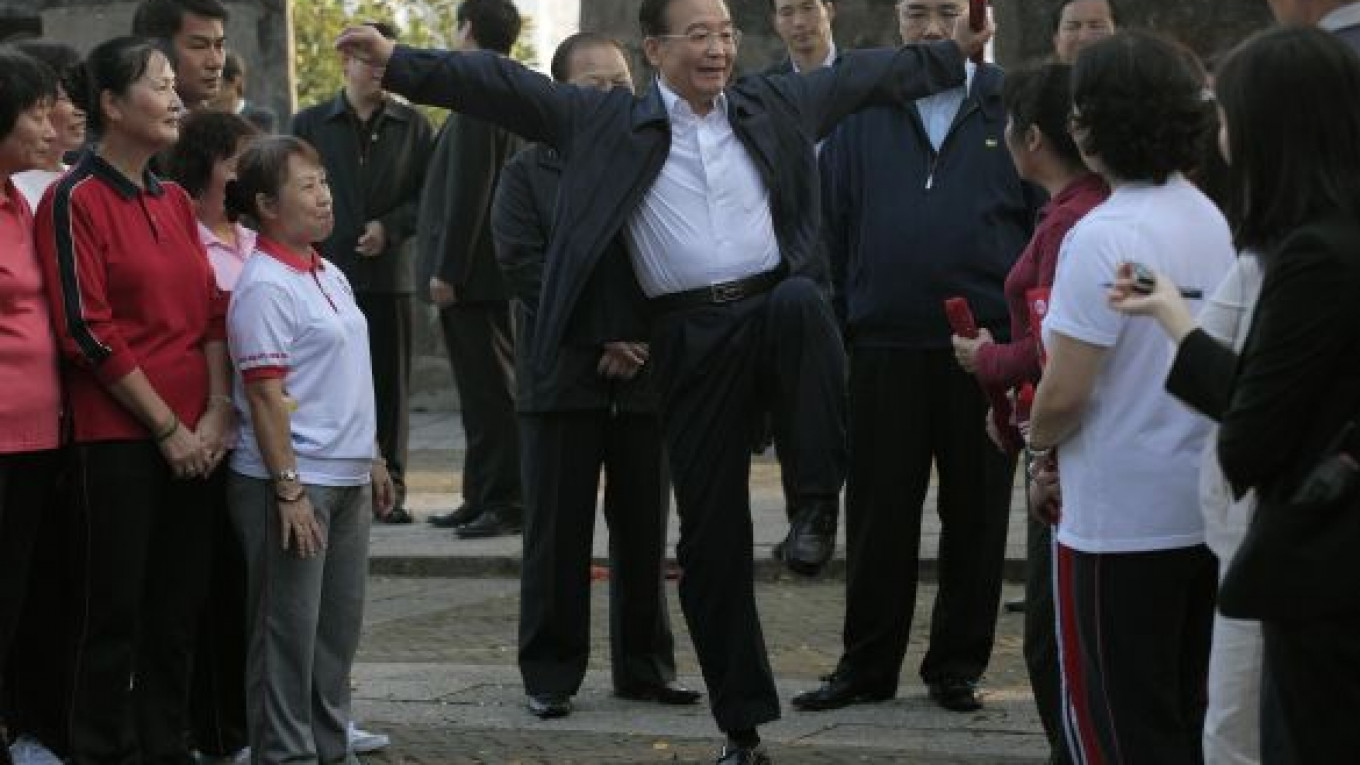BEIJING — Economic cooperation will likely top the agenda when Chinese Premier Wen Jiabao visits Russia from Monday, even as the two nations remain divided over the pricing agreement for the gas that Russia will supply to China.
Russia is looking for Chinese investment in sectors such as energy and telecoms, while resource-hungry China has been eager to secure long-term oil and gas supplies from Russia, the world's biggest energy producer.
The talks will also touch on the countries' close energy ties, Chinese officials told reporters at a Foreign Ministry briefing Thursday, adding that they hope to resolve the dispute about gas pricing, which has dragged on for years.
"We are still largely divided on pricing," Gu Jun, deputy director general of the National Energy Administration, said at the briefing. "We need to demonstrate sincerity on both sides to see whether we can push forward with the negotiations."
"The pricing negotiation is an important part of Vice Premier Wang Qishan's trip, and we hope to narrow the divide then," she added.
Russia has begun test-pumping about 600,000 metric tons of oil along the new East Siberian-Pacific Ocean pipeline that is set to start bringing 300,000 barrels per day to China in January next year.
Gu said the difference in pricing between the two countries is $100 per 1,000 cubic meters.
Wen's visit underscores the increasingly close relationship between two of the world's biggest emerging economies and comes as China looks to expand into export markets beyond the struggling U.S. and European economies.
"The economy will be on the forefront this time, specifically on how to improve the trade structure between Russia and China," said Zhao Huasheng, director at the Center for Russia and Central Asia Studies at Shanghai's Fudan University.
"Although the relationship is developing very fast, as an absolute value, it's still quite small," Zhao said. "The foundations are still weak. It's not like what we have with the U.S., Japan and the European Union."
Even though trade and political ties are better, some senior Russian officials are privately concerned about an increasingly assertive China along their vast border.
In early September, Prime Minister Vladimir Putin told Russians that they need not fear China amid worries that millions of Chinese will some day settle swathes of Russian territory in the Far East.
"The economic relationship between China and Russia can be characterized as: Russia has energy and resources, while China has the market," Zhao said.
"But this thinking might not be welcomed by the Russians — they don't want to be seen as just a country for exporting resources," he said. "That could be a sticking point."
Russia is China's 13th-largest trade partner, but two-way trade rose 43.4 percent to $45.1 billion in the first 10 months of this year, according to Chinese customs data.
The Kremlin expects the volume this year to return to the $55.9 billion recorded in 2008, before the economic crisis.
China accounts for just 9 percent of Russia's foreign trade, while the European Union claims 50 percent.
At the same time, Russia has been eager for more Chinese cash to fuel growth.
China agreed in October to lend Russia $6 billion for the development of coal deposits, while China Investment Corporation has said it is interested in bidding for Russian state assets in a sale that is expected to raise $50 billion.
Russia, which has already built a nuclear reactor in China, plans to supply the bulk of the crude oil processed by a $5 billion refinery that is being built in Tianjin. Gazprom will also build a new gas pipeline to China through the Altai region of southern Siberia.
Russia and China have long struck close positions on international issues, after settling border disagreements that had previously plagued their relations and almost sparked a war in 1969.
Both countries echo each other in opposing U.S. global dominance, most recently criticizing the second round of stimulus spending by the U.S. Federal Reserve.
Wen will also travel to Tajikistan for a meeting of the Shanghai Cooperation Organization — a Central Asian regional group comprising Russia, China and four Central Asian states.
A Message from The Moscow Times:
Dear readers,
We are facing unprecedented challenges. Russia's Prosecutor General's Office has designated The Moscow Times as an "undesirable" organization, criminalizing our work and putting our staff at risk of prosecution. This follows our earlier unjust labeling as a "foreign agent."
These actions are direct attempts to silence independent journalism in Russia. The authorities claim our work "discredits the decisions of the Russian leadership." We see things differently: we strive to provide accurate, unbiased reporting on Russia.
We, the journalists of The Moscow Times, refuse to be silenced. But to continue our work, we need your help.
Your support, no matter how small, makes a world of difference. If you can, please support us monthly starting from just $2. It's quick to set up, and every contribution makes a significant impact.
By supporting The Moscow Times, you're defending open, independent journalism in the face of repression. Thank you for standing with us.
Remind me later.






